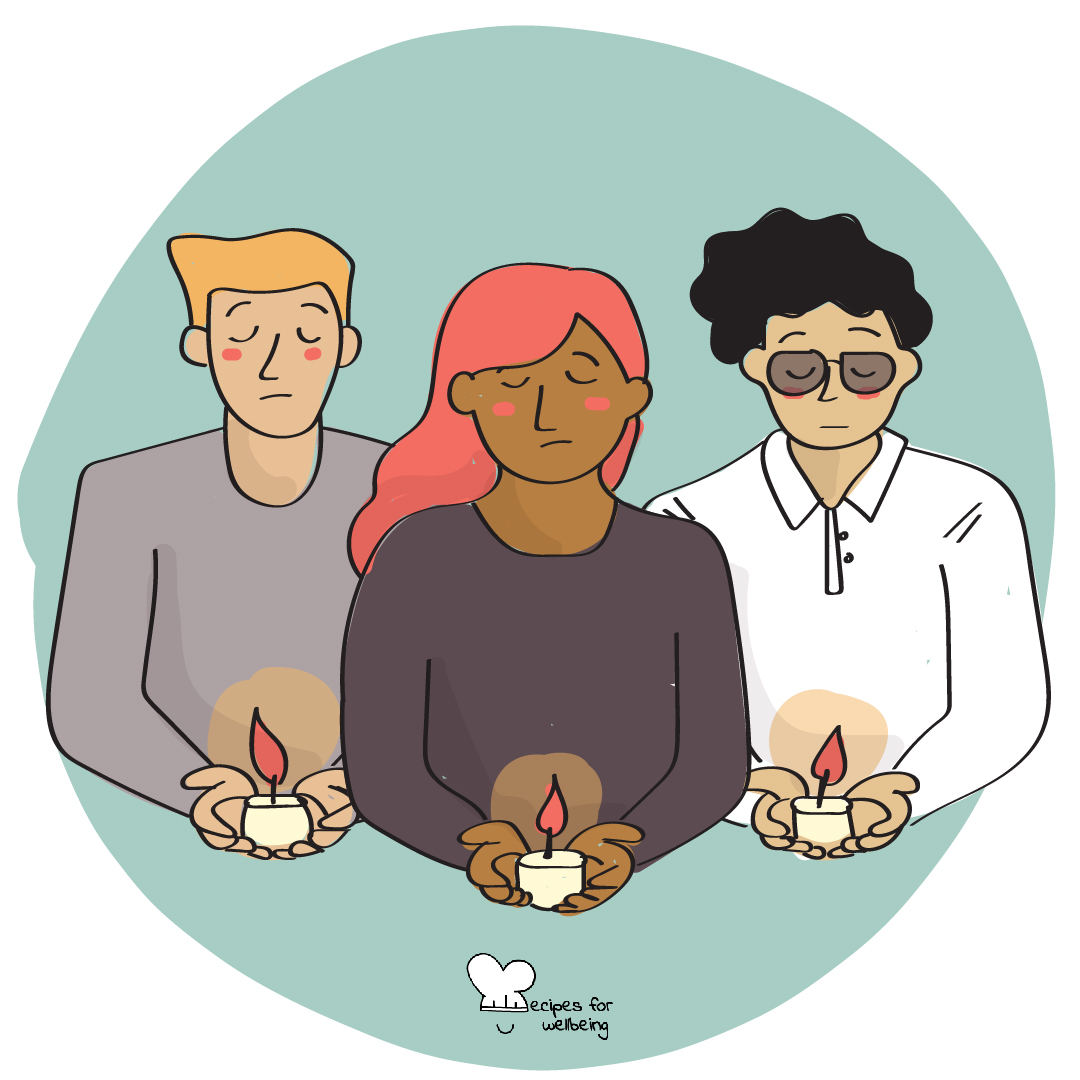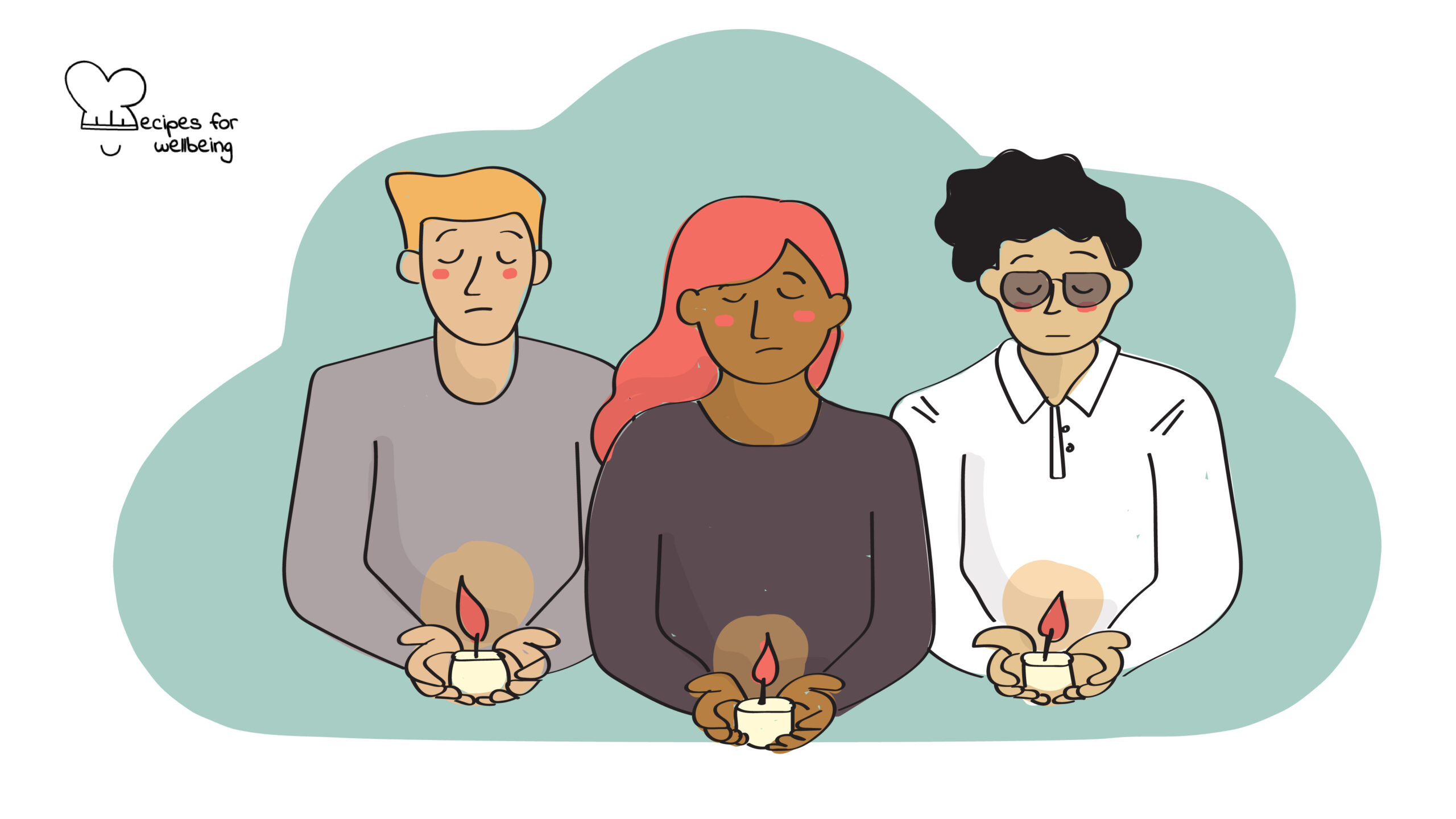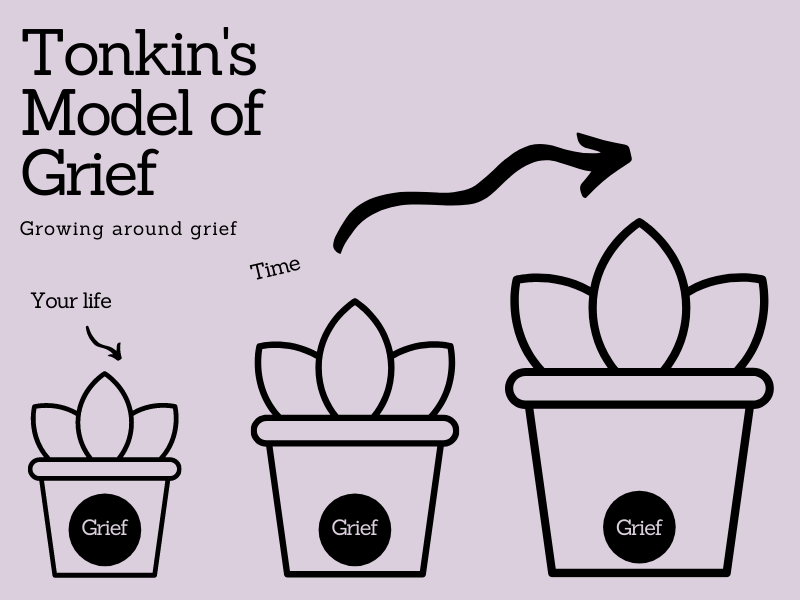
Gentleness through grief
What you leave behind is not what is engraved in stone monuments, but what is woven into the lives of others. —Pericles
👥 Serves: 1 person
🎚 Difficulty: Hard
⏳ Total time: Ongoing
🥣 Ingredients: Self-compassion
🤓 Wholebeing Domains: Discomfortability
💪 Wholebeing Skills: Acceptance, Compassion, Grieving, Self-regulation, Vulnera-bravery

Gentleness through grief
📝 Description
Learn to be gentle with yourself through grief.
Undoubtedly, the most complex and profound experiences that humans must endure is grief. Grief does not always mean bereavement, though commonly it is. Grief can occur with divorce or dramatic changes in a relationship, including with friends, a change in your health or the health of a loved one, the loss of a job, significant changes in life such as retirement, children moving out, or moving to a new city or country.
Regardless of the reason behind your individual experience with grief, know that it is valid. It is a complicated experience that does not ever go away but can become slightly easier to carry with time. There is no correct or incorrect way to grieve. Everyone will have a unique experience and all we can do as humans is our best. Remind yourself that you are not alone in this universal experience.
This recipe has been inspired by the work of psychiatrist Elisabeth Kubler-Ross and Dr Lois Tonkins, a researcher, writer, counsellor and lecturer in fertility issues and loss and grief studies and has been adapted by our wellbeing content writer collaborator Marissa Del Mistro.
👣 Steps
Step 1 – Understand the 5 stages of grief (ongoing)
In 1969, Swiss-American psychiatrist and author, Elisabeth Kubler-Ross, developed the 5 stages of grief to support people who are/were face to face with mortality. The 5 stages remain useful and can help you to understand loss and the complicated rollercoaster of grief. Having this knowledge may make you recognise what you are feeling.
The 5 stages of grief are:
- Denial
An overwhelming feeling of numbness is common in the early stages of grief. This can manifest with attending work, classes, and their responsibilities as “normal”. Both the conscious and subconscious mind know there is something amiss, but they both are grappling with making sense of a harsh, new reality. Really, our minds are trying to slow everything down in an attempt to let things process.
- Anger
Society likes to say that anger is a “bad” emotion. Anger, however, is a normal, healthy emotion that every single person feels from time to time. Anger can spark positivity, stir up new ideas and a call for change. In relation to grief, anger is a common experience when trying to understand a new reality or loss. Anger is related to extreme emotions or discomfort – and it is related to fear. Sometimes, it’s easier to say you are angry than you are terrified.
- Bargaining
When trying to navigate a great loss, it can conjure up a feeling of desperation, in the form of a plea to minimise your hurt and sadness. There are many ways one can bargain, such as “God, please heal this person and I will visit your church every week”, or “I will never get angry at this person again if you just give me another chance.” Bargaining is often directed to a higher power, or something bigger than we understand in an attempt to change the course of reality.
It is also common to reflect in this stage through a repetitive battle of “What ifs”, “How could I…”, “If only I…”, “Why did I do this?”, etc. making the emotional assumption that if you had acted, even slightly better, things simply wouldn’t be this way.
There is a sobering feeling of great insignificance the moment one realises that despite our bargaining attempts, nothing can change the sombre results.
- Depression
At last, reality. Imagination halts its untrue stories in our mind and our bargaining attempts feel feeble.
It is at this stage you can feel the heaviness of the truth and the immense pain as the emotional fog begins to clear. It may be the single greatest sadness you’ve ever felt, as it pulls you down into a feeling of isolation, fatigue, brain fog, loss of appetite, and great longing.
This stage is intense and comes in waves – in the form of anniversaries, reminders by way of certain songs, places, or people. Life can feel very scary and heavy at this stage.
- Acceptance
If you open the dictionary, acceptance is defined as “the quality or state of being accepted or acceptable”.
Yet, it is not that linear when it comes to grieving. Grief is like the ocean, constant and never still, dancing by wind-driven waves or surface waves, some in power crashes, intense and unexpected, while others stir gently at the shore.
People who experience great loss may never ‘get over’ their experiences but it is possible to learn to put life together again, returning to a regular routine even with slivers of joy and laughter making an appearance.
Consider Lois Tonkin’s model of grief in relation to acceptance. Tonkin is a grief counsellor who created this model to highlight that at the onset, grief is all consuming and can permeate its way into all aspects of life.
Rather than the grief declining over time, it can stay the same size, however your life continues to build around it, including and respecting the loss. Some days, the grief may be quieter as the days go on, and as you create tools and healthy coping mechanisms. But there are days it is just as loud as day one.

Tonkin’s Model of Grief
Step 2 – Be gentle with yourself as you grieve (ongoing)
The important fact about grief is that everyone will experience it differently and there is no right or wrong way to experience it. The five stages of grief are useful as tangible standing points to understanding the feelings you are experiencing.
The 5 stages of grief may not resonate with you, not even a little, and that is normal and completely okay. In this hard time, it’s important to go easy on your heart, mind and body as you move through your feelings.
You may benefit from reading another of our recipes “Dealing with loss” with suggestions on coping and navigation this time. Additional suggestions on how to invite gentleness into your life through grief:
- Create new traditions: Make a donation to a charity on behalf of the one you lost, plant a tree, honour a loved one by cooking their favourite dish and enjoy it with a loved one, plunge into the ocean on a special date, create a gratitude jar, or get an inscribed bench at their favourite view point.
- Join a support group: Speaking does wonders for a tired heart. Speaking to people who can relate, even to some extent, is like picking up the pieces of that tired heart.
- Appreciate touch: Hug friends, hold hands, kiss a friend’s baby, stroll arm in arm and go for a massage. If a massage feels like too much, learn the accessible joy of self massage for the neck, back, feet and hands.
- Create a personal grief map: Not unlike mind maps, draw a grief map, to express your emotions, feelings on paper. Check out our recipe “Mind mapping for grief” for full instructions.
- Plan ahead for triggers: Events like anniversaries, holidays, and important milestones can re-open wounds. Be prepared for these inevitable days by planning something special for that day, try not to be alone, and journal what you are feeling. If you feel up to it, mark the date in a creative and personal way.
- Keep up with healthy habits: This one can feel impossible and it’s important to not judge yourself. Where you can, eat healthy meals (or organise a healthy meal plan to be delivered or ask friends for big batches of soup), try to do some exercise by getting outside for walks and ensure you get sufficient sleep. The grieving process can take a significant toll on your physical health so it’s important to watch you care for yourself the best you can. And remember: it’s okay to ask for help.
- No one can dictate to you your grief: Do not listen to anyone who tells you how to handle your grief – it is for you to walk through, to understand and to feel and you should do so without any judgement or shame from others. It is perfectly normal to want to cry, it is also perfectly normal to want to laugh. Everything you feel is okay.

